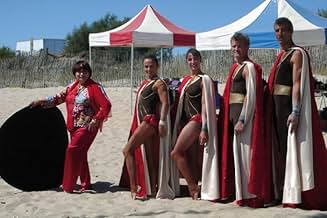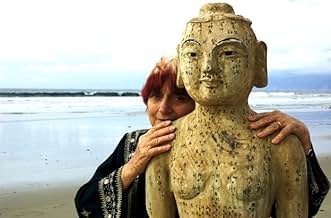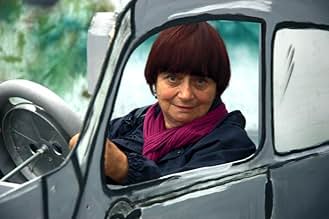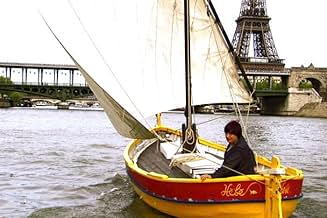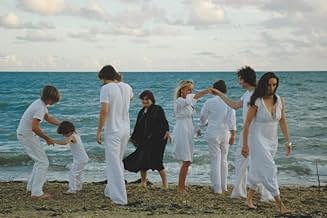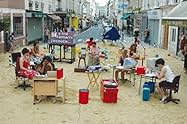IMDb RATING
8.0/10
5K
YOUR RATING
Agnès Varda explores her memories, mostly chronologically, with photographs, film clips, interviews, reenactments, and droll, playful contemporary scenes of her narrating her story.Agnès Varda explores her memories, mostly chronologically, with photographs, film clips, interviews, reenactments, and droll, playful contemporary scenes of her narrating her story.Agnès Varda explores her memories, mostly chronologically, with photographs, film clips, interviews, reenactments, and droll, playful contemporary scenes of her narrating her story.
- Awards
- 12 wins & 13 nominations total
Gerald Ayres
- Self
- (as Gerry Ayres)
Patricia Louisianna Knop
- Self
- (as Patricia Knop)
- Director
- Writers
- All cast & crew
- Production, box office & more at IMDbPro
Storyline
Did you know
- TriviaFrench visa # 118156.
- ConnectionsEdited into Film socialisme (2010)
Featured review
"The Beaches of Agnes" is an autobiographical documentary done in a uniquely impressionistic style. The subject is Agnes Varda, the legendary French director who began her career in the 1950s and, who at the age of 80, shows that she is still a master of her art and craft. For not only does Varda provide the voice-over narration for the film, but she conceived and directed the project as well.
Varda uses as her focal point the various beaches where she spent a great deal of her time growing up. It is to these places that she has brought a crew of filmmakers to shoot her delivering extended monologues on her life and to restage - often in a cleverly amusing and surrealistic style - memories and events that have remained with her throughout the years. When she has actual photos and file footage from the past, she is quick to use them, but when she doesn't, she turns to present-day re-creations to fill in the gaps. But all is not limited to the beach, for she frequently heads inland to retrace the steps of her life, visiting key locations along the way.
She explores her childhood, when she lived much of the time on a houseboat; her teen years, when she was thoroughly ignorant of what a woman could do in the world and of the realities of man/woman relationships; her experiences during the War and the Occupation, when most French citizens "lived day to day;" her years studying art at the Ecole du Louvre; her first taste of freedom and independence when she stole off one night all on her own to Corsica; her time spent as a fisherman; her burgeoning fascination with photography; her marriage to fellow director and film-making inspiration, Jacques Demy; her role as mother and grandmother; her trips to Cuba and Southern California in the 1960s to capture in photos and on film the turbulent nature of that period; her fervent pro-feminist leanings that often found their way into her movies; and her eventual transition to film-making herself to become the only female figurehead of the French New Wave, an otherwise Young Boys' Club that included, in addition to Demy, Godard, Truffaut, Resnais, and various other cinematic masters.
It is here that the movie turns to Varda's career as a filmmaker, as the artist herself discusses her inspirations, her key themes and concerns, and the logistical problems of the movie-making process itself. The movie provides us with a generous sampling of clips from not just her own movies but those of Demy as well.
As she reflects back on her life, Varda addresses the issues of aging, memory, and personal loss (especially of her beloved Jacques, who died of AIDS in 1990). She views the sea as representative of permanence - and human beings and their foreshortened life spans as symbols of the universe at its most temporal. Through its mixing of the real with the surreal, the literal with the figurative, "The Beaches of Agnes" mirrors the hybrid nature of Varda's photographic and cinematic works themselves.
But the movie is often at its most charming when it is content to simply BE, when some seemingly random image, person, event or thought comes along to capture Varda's complete and undivided attention - a testament to her astute powers of observation, to her complete and utter absorption in the moment, and to her ability to make art out of the raw materials of actual life.
And isn't that what movie-making is really all about, after all?
Varda uses as her focal point the various beaches where she spent a great deal of her time growing up. It is to these places that she has brought a crew of filmmakers to shoot her delivering extended monologues on her life and to restage - often in a cleverly amusing and surrealistic style - memories and events that have remained with her throughout the years. When she has actual photos and file footage from the past, she is quick to use them, but when she doesn't, she turns to present-day re-creations to fill in the gaps. But all is not limited to the beach, for she frequently heads inland to retrace the steps of her life, visiting key locations along the way.
She explores her childhood, when she lived much of the time on a houseboat; her teen years, when she was thoroughly ignorant of what a woman could do in the world and of the realities of man/woman relationships; her experiences during the War and the Occupation, when most French citizens "lived day to day;" her years studying art at the Ecole du Louvre; her first taste of freedom and independence when she stole off one night all on her own to Corsica; her time spent as a fisherman; her burgeoning fascination with photography; her marriage to fellow director and film-making inspiration, Jacques Demy; her role as mother and grandmother; her trips to Cuba and Southern California in the 1960s to capture in photos and on film the turbulent nature of that period; her fervent pro-feminist leanings that often found their way into her movies; and her eventual transition to film-making herself to become the only female figurehead of the French New Wave, an otherwise Young Boys' Club that included, in addition to Demy, Godard, Truffaut, Resnais, and various other cinematic masters.
It is here that the movie turns to Varda's career as a filmmaker, as the artist herself discusses her inspirations, her key themes and concerns, and the logistical problems of the movie-making process itself. The movie provides us with a generous sampling of clips from not just her own movies but those of Demy as well.
As she reflects back on her life, Varda addresses the issues of aging, memory, and personal loss (especially of her beloved Jacques, who died of AIDS in 1990). She views the sea as representative of permanence - and human beings and their foreshortened life spans as symbols of the universe at its most temporal. Through its mixing of the real with the surreal, the literal with the figurative, "The Beaches of Agnes" mirrors the hybrid nature of Varda's photographic and cinematic works themselves.
But the movie is often at its most charming when it is content to simply BE, when some seemingly random image, person, event or thought comes along to capture Varda's complete and undivided attention - a testament to her astute powers of observation, to her complete and utter absorption in the moment, and to her ability to make art out of the raw materials of actual life.
And isn't that what movie-making is really all about, after all?
- How long is The Beaches of Agnès?Powered by Alexa
Details
- Release date
- Country of origin
- Official sites
- Languages
- Also known as
- Las playas de Agnes
- Filming locations
- Production companies
- See more company credits at IMDbPro
Box office
- Budget
- €1,900,000 (estimated)
- Gross US & Canada
- $239,711
- Opening weekend US & Canada
- $19,032
- Jul 5, 2009
- Gross worldwide
- $2,235,006
- Runtime1 hour 52 minutes
- Color
- Aspect ratio
- 1.85 : 1
Contribute to this page
Suggest an edit or add missing content


![Watch Bande-annonce [OV]](https://m.media-amazon.com/images/M/MV5BZGYxNzE1MDgtYjIzMy00NmY0LTkyMmItMTFkZjVlNmMyNTVmXkEyXkFqcGdeQXRyYW5zY29kZS13b3JrZmxvdw@@._V1_QL75_UX500_CR0)



